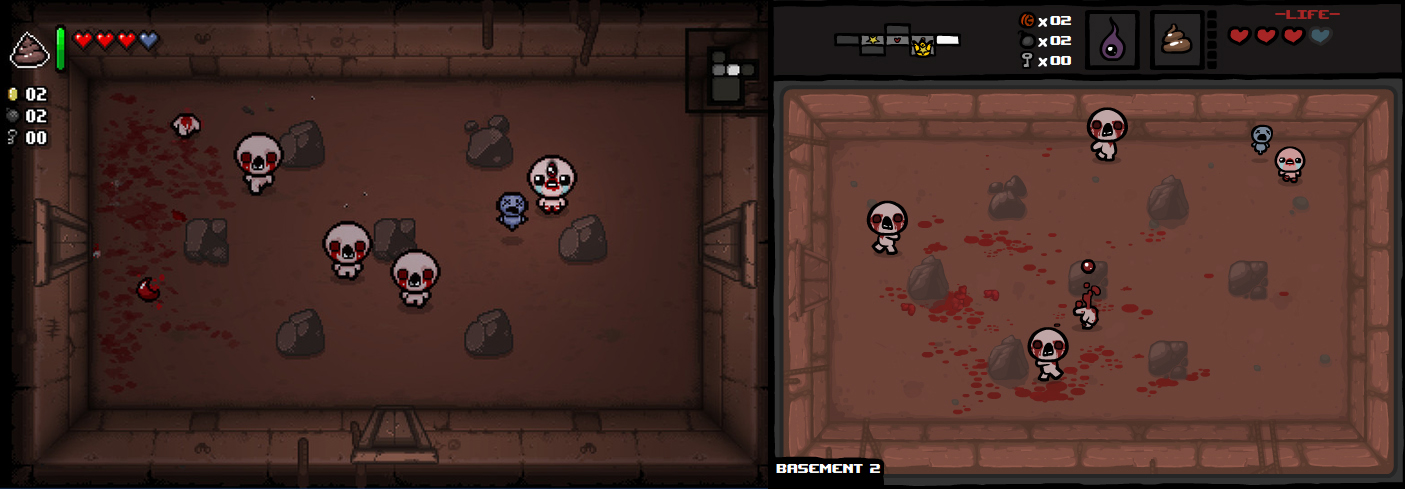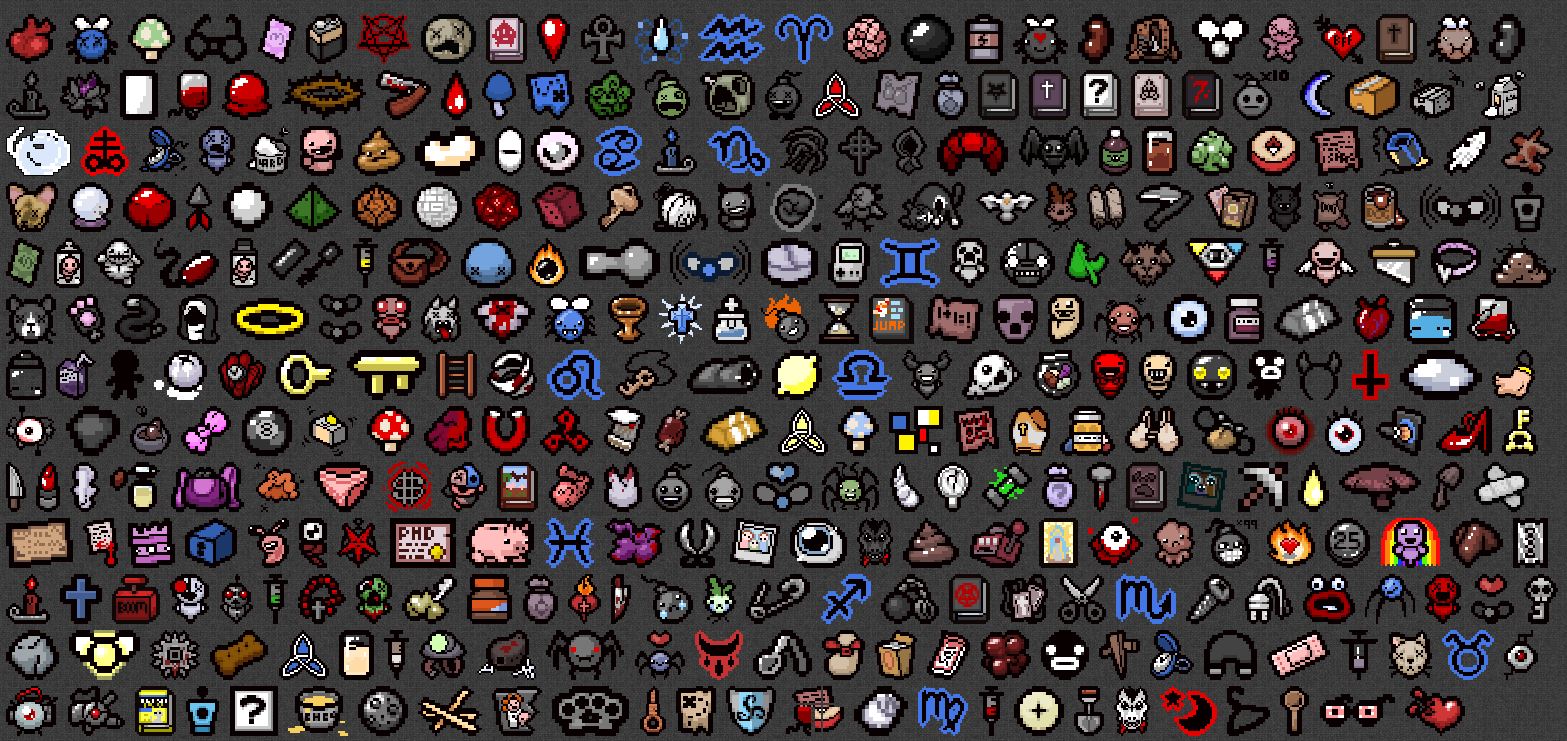It’s been nearly six years since designer Edmund McMillen released The Binding of Isaac, a simple roguelike directly inspired by the mystery and surprise of the original Legend of Zelda. To McMillen’s surprise, The Binding of Isaac exploded in popularity, prompting an expansion pack, a remake, and an expansion pack to the remake. The most recent add-on, Afterbirth Plus, includes a few new features and items but most importantly, modding support. It’s engineered to be McMillen’s send off to a game that’s brought equal parts grief and elation.
“I want to be able to close the book on this,” he told me.
Videos by VICE
For a period, McMillen’s name was synonymous with 2010’s Super Meat Boy, a brutal platformer likely to go down as one of the genre’s classics. The Binding of Isaac started as a side project, a way to distract from the stresses of developing, releasing, and supporting that game.
Underscoring the slapdash nature of it all was coding it in Flash, a technology that’s easy to build in but notoriously limited. Even with a beefy computer, for example, The Binding of Isaac ran like shit. The design and balance of the game was equally flawed, but since it was an experiment before Team Meat worked on something new, it wasn’t supposed to matter.
But The Binding of Isaac took off, gripping the same kinds of people who’d become obsessed with Spelunky, and McMillen suddenly found himself trying patch the game’s glaring holes.
“Issac is a weird game, and it’s hard for me to not see this thing full of flaws,” he said. “The only way for me to fix the flaws that exist in the game right now—I would need to make new one, and that’s not gonna happen. [laughs] I try to my best to expand on what’s there and fix what I can, but the reality is that everybody plays it very differently—very, very differently. I’m in the minority group of how I want to play the game, so it’s not even abiding by my rules anymore.”

When The Binding of Isaac was remade as The Binding of Isaac: Rebirth, its technology was revamped and art was redone with 16-bit stylings. All images courtesy of Nicalis
Most games are desperate to tell you how they work, hoping you’ll keep playing. The Binding of Isaac was the opposite; very little was explained. The only way to understand an item was to use it, and even then, you ran of the risk of picking up an item that may, in fact, suck. (You can find strategies online for even the most seemingly useless of items, though.)
In 2011, the game included 196 items. Later, that number jumped to 341. Then, 436. In the most recent version of The Binding of Isaac, the game sports 504 items, and that doesn’t count the 118 trinkets, items with a passive bonus, like increasing the chance of health items appearing.
“I can’t even remember it all,” said McMillen.
Because there’s so much in the game, players started building databases to keep track of it all, the most popular of which is an interactive wiki called Platinum God, which lets you hover your mouse over an item and immediately see what it does and what’s needed to find or unlock it.
It wasn’t supposed to turn out this way, though. When McMillen first played Minecraft, he found himself enchanted by the creation tools but frustrated at the crafting process; it basically required players to seek out guides and videos explaining how to use certain materials. It never crossed his mind that he might end up making a video game with the same problem.
“Once its popularity grew enough that people liked playing it a lot, you started seeing people saying ‘Oh, I play with the wiki open.’ Oh, did I create that game? Did I create the game that I scoffed at? [laughs] […] I knew that people were going to spoil it, but I didn’t realize that it would ever become popular enough that a lot of people played it and wanted to play it ‘right.’
“In order to do that, they don’t want to learn, they just want to know how to break the game. They want to know if this item that they picked up is going to fuck them over or if it’s going to bust them, or how to exploit said item. They don’t want to explore the mystery anymore.”
I’m not going to be that curmudgeonly artist who’s like ‘This is my art!’ In the original game, I was very much like ‘This is my art! Fuck you, this is the way it’s going to be.’
This is part of a larger struggle McMillen has with The Binding of Isaac: though he designed the game, in a lot of ways, it’s no longer his anymore. I reached out to McMillen after he polled people on Twitter about possible design solutions to the wiki problem. (My solution, which he thought had merit, involved players being able to see an item description after encountering an item the second time. Prior to that, it’d remain a mystery to them.) But every time McMillen proposes a change, he’s met with sharp resistance from some segment of the community.
“People will accept only a certain amount of things when it comes to Isaac, at this point,” he said. ” […] I’m not going to be that curmudgeonly artist who’s like ‘This is my art!’ In the original game, I was very much like ‘This is my art! Fuck you, this is the way it’s going to be.’”
When McMillen polled Twitter, the voting was split. Out of 8,920 votes, 35% felt adding text would take away from the game, 35% thought it was a good idea, 20% didn’t really care, and 10% felt not having it was really hurting the game. The polling was a way of testing the waters, but McMillen had no interest in adding such a feature to the game himself. Even if he thought it would improve the game, it was likely to prompt the kind of backlashes he’s endured for years.
His solution was to remove himself from the equation and add mod tools to The Binding of Isaac, handing over control of the game’s future to the people who loved it most. The plan is for McMillen is to pluck the most interesting mods from the community and update the official game with them as options. It’s likely an upcoming pack will include a mod with item descriptions, but as it wasn’t touched by the hand of God, the community is unlikely to react.

A look at the 341 possible items you can find in The Binding of Isaac: Rebirth. Image courtesy of Platinum God
“It’s why it needs to stop,” he said. “The best way to stop it is to give the community as many mod tools and abilities as possible and let them go nuts. There’s been some impressive shit being made and they don’t even have full access to everything yet. The great thing about the community, too, is that for all the people who are being dicks about it, there were also quite a few very, very talented people.”
McMillen is looking forward to getting out of The Binding of Isaac’s shadow with a series of upcoming projects, including The Legend of Bum-bo, a turn-based puzzle RPG due for release “sometime this year.” His other game is a secret and he refused to say much, other than confirming it’s “full of mystery” in a way that’ll make sense when people see what the story is.
Even working with puzzles has been a little frustrating, though. How do you stop people from heading over to YouTube and spoiling everything, the moment they run into some frustration?
“I have a bunch of designs for games that I’d like to do in the future,” he said. “I have this one that’s kind of a Myst-like game, which is all about mystery. How do you break it up so people can’t just go and look online and solve whatever problem that I came up with? I have a few ideas of how to randomize solutions so it would make it so you couldn’t!”
Whether he can ever truly leave The Binding of Isaac behind, though, remains to be seen. I’m skeptical.
Follow Patrick on Twitter. If you have a tip or a story idea, drop him an email here.
More
From VICE
-

Andrew Harnik/Getty Images -

Screenshots: YouTube/Xbox, YouTube/PlayStation -

Screenshot: Electronic Arts -

Screenshot: Shaun Cichacki
